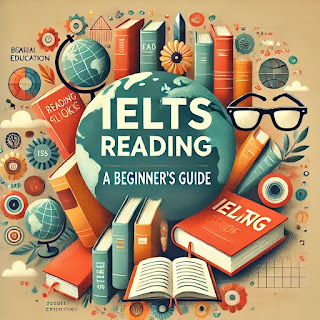Preparing for the IELTS Reading module as a beginner can feel overwhelming. With 40 questions to answer in just 60 minutes, and passages filled with complex vocabulary and tricky details, it's natural to feel daunted. However, with the right strategies and consistent practice, you can tackle the IELTS Reading test with confidence and achieve your desired score.
This comprehensive guide provides effective tips
for beginners to ace the IELTS Reading module and make your preparation journey
smoother.
Understanding the IELTS Reading Module
Before diving into preparation tips, it’s
essential to understand the format of the IELTS Reading test:
1. Test
Types: There are two versions of the IELTS test—Academic and General
Training. The Reading test is slightly different for each:
- Academic Reading includes three long,
complex passages from books, journals, or magazines.
- General Training Reading includes passages based on
everyday contexts, such as advertisements, workplace guidelines, and
newspapers.
2. Time
Management: You have 60 minutes to complete 40 questions across three
passages.
3. Question
Types: You’ll encounter a variety of questions, including:
- Multiple-choice
questions
- True/False/Not
Given
- Matching
headings
- Sentence
completion
- Summary
completion
Understanding the structure is the first step in
building your confidence.
Top IELTS Reading Preparation Tips for
Beginners
1. Build Your Vocabulary
The IELTS Reading passages often include academic
or formal language, making a strong vocabulary essential. Here’s how to
improve:
- Learn Words in Context: Don’t just memorize lists of words. Read
newspapers, magazines, or academic articles and note down unfamiliar
words. Learn their meanings, synonyms, antonyms, and usage.
- Focus on Common IELTS Topics: Environment, education,
technology, and health are frequent themes in IELTS passages. Build
topic-specific vocabulary.
- Use Flashcards:
Apps like Anki or Quizlet can help you review words daily.
2. Practice Skimming and Scanning
Time is a critical factor in the IELTS Reading
test, so mastering skimming and scanning techniques is crucial:
- Skimming:
Quickly read through a passage to get the main idea. Focus on headings,
subheadings, and the first and last sentences of paragraphs.
- Scanning:
Look for specific details such as dates, names, or numbers without reading
every word.
These techniques help you locate answers faster.
3. Understand Question Types
Different question types require different
approaches:
- True/False/Not Given: Understand whether the statement agrees with,
contradicts, or is absent from the text.
- Matching Headings: Identify the main idea of each paragraph.
- Summary Completion: Use contextual clues to fill in blanks with
the correct words.
Practice each type regularly to become familiar
with their patterns.
4. Improve Your Reading Speed
Reading speed plays a vital role in completing
the test on time:
- Set a Timer:
Practice reading passages within a set time limit. Gradually reduce the
time as you improve.
- Read a Variety of Materials: Diversify your reading with newspapers, online articles, and academic journals.
5. Focus on Keywords
Keywords help you locate answers quickly:
- Underline Keywords: In the questions, underline words like dates,
names, or specific terms.
- Paraphrasing:
Remember that the passage often paraphrases the question. Look for
synonyms or related phrases.
6. Practice with Official Materials
The best way to familiarize yourself with the
IELTS Reading test is to practice with authentic materials:
- Use
official IELTS practice tests available on the IELTS websites.
- Books like The
Official Cambridge Guide to IELTS provide excellent resources for
practice.
7. Time Management Tips
Time pressure is one of the biggest challenges in
the Reading module. To manage your time effectively:
- Spend no
more than 20 minutes per passage.
- Attempt
easy questions first and return to challenging ones later.
- Avoid
spending too much time on a single question. Guess and move on if needed.
8. Learn to Identify Trap Answers
Some answer options are designed to mislead you:
- Too General or Specific: Ensure the answer fits the scope of the
question.
- Extreme Language:
Be cautious with options containing words like always, never,
or completely.
9. Practice Regularly
Consistency is key to improving your reading
skills:
- Set
aside daily time for reading practice.
- Analyze
your mistakes and focus on improving weak areas.
10. Take Full-Length Mock Tests
Simulate test conditions by taking full-length
IELTS Reading tests. This will help you:
- Get
used to the time constraints.
- Build
stamina for the real exam.
Additional Resources for IELTS Reading
Preparation
Here are some valuable resources to support your
preparation:
1. Websites:
- IELTS.org
- British Council
2. Apps:
- IELTS Prep by British Council
- IELTS Practice & Prep
3. Books:
- IELTS
15 Academic/General Training (Cambridge IELTS series)
- Barron’s
IELTS Superpack
4. Online
Practice Tests:
- Websites like IELTS Buddy and IELTS Liz offer free practice tests and tips.
Common Mistakes to Avoid
Even with the best preparation, some mistakes can
lower your score:
- Not
Following Instructions: Pay close attention to word limits
and specific requirements for each question.
- Overthinking
Answers: Don’t overanalyze questions or second-guess
yourself too much.
- Neglecting
Time Management: Spending too long on a single passage can
leave you short of time.
- Skipping Practice Tests: Practice tests are essential for building confidence and familiarity.
Final Thoughts
The IELTS Reading test may seem challenging at
first, but with the right preparation strategies and consistent effort, you can
achieve your target band score. Start early, focus on building your skills step
by step, and practice regularly with authentic materials.
Remember, it’s not just about reading faster—it’s
about understanding the content, identifying keywords, and mastering various
question types. By following these beginner-friendly tips, you’ll be
well-prepared to tackle the Reading module and move closer to your IELTS goals.
Good luck, and happy studying!



